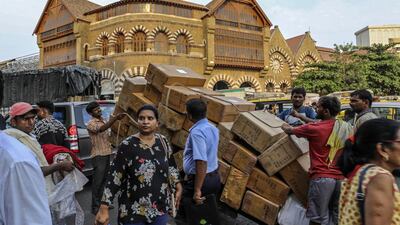mumbai // India’s long-awaited goods and services tax, or GST, is set to be rolled out this weekend, with businesses reacting with a mix of excitement and trepidation to the levy that is expected to add up to 2 per cent to GDP.
India will usher in the ambitious reform at midnight, as July 1 begins, with Narendra Modi’s government planning a special midnight session of parliament to mark the event.
“Clearly there is a mix of sentiments, from expectations of initial chaos to significant work to manage the change and make it a part of the routine process within enterprises,” said Srividya Kannan, the founder and director of Avaali Solutions, a consultancy based in Bangalore.
The new tax is set to replace the labyrinth of varying taxes found across India’s states with a uniform tax regime and is considered to be one of the country’s most significant economic reforms in decades. Some economists are quite bullish on the economic impact of the tax. A US Federal Reserve paper released in March said implementation of the tax could have “a positive impact” on GDP of 4.2 per cent.
“This is set to be a quantum leap for our economy in terms of ease of conducting business, widening our tax net and simplifying our tax structures,” said Ms Kannan. “There is a lot of activity going on within enterprises to make themselves fully prepared for the July 1 deadline. Large enterprises are prepared for this change, while a lot of small enterprises are still believed to face some distress.”
Mr Modi on Sunday met heads of some of the biggest US companies on the first day of a two-day visit to Washington, during which he highlighted that India’s business environment was set to improve under GST, as he strives to attract more foreign investment.
Vrishank Jain, who has a family business jewellery shop in the bustling gold market of Zhaveri Bazaar in Mumbai, said that he was somewhat concerned in the lead-up to the launch of GST. “We know the rates, but we don’t really know anything else about it,” he said. He explained that he was concerned that it would add to their workload generally.
Rahul Pillai, the chief executive of Interem Relocations, based in Dubai and with operations in India, said that the new regime “would make carrying out business activities much easier for companies operating in more than one state”.
“GST is expected to significantly ease double taxation and make taxation overall easy for the industries,” he said. “For the end customer, the most beneficial will be in terms of reduction in the overall tax burden on goods and services. Introduction of GST will also make Indian products competitive in the domestic and international markets.”
There have been some calls for the roll-out of GST to be postponed, with some businesses saying they are not ready for its implementation.
The government this month reduced the proposed GST rates for dozens of items to ease concerns that it could hurt businesses in some industries.
For example, the proposed GST on cinema tickets under 100 rupees (Dh5.6) was reduced from 28 per cent to 18 per cent, while rates on chutneys and pickles were reduced from an earlier suggested rate of 18 per cent to 12 per cent.
India’s finance minister, Arun Jaitley, also this month said it would allow late filing of returns for the first two months to allow companies to adjust to the system.
“In the long term, GST is definitely expected to be a major catalyst of growth and is much required for the Indian economy,” said Ms Kannan.
business@thenational.ae

